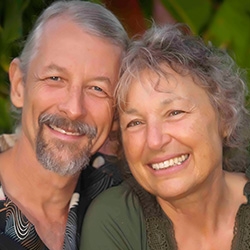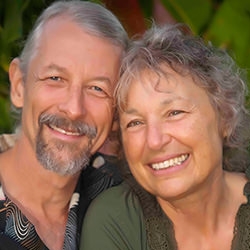

Search Results: learning
-
Rita learns the power of silent empathy while visiting her daughter and offering unsolicited advice.
-
Trainer Tip: Many of us are afraid of our anger because we haven’t learned how to express it in a way that brings relief or that helps us meet our needs in the situation. Consider a different approach to anger, one that helps you fully express your anger and is more likely to help you meet your needs for relief, to be heard, or to be understood.
-
Tired of flat, confusing empathy? Cultivate a natural, authentic flow for greater connection.
-
Listen to Jim and Jori Manske share how we are conditioned to disconnect from our own feelings and how we can unlearn this habit to experience more full and rich inner lives.
-
We can dream and wait for the day to do things differently, or we can continually take steps towards the future of our dreams as though it were here now. The future will not be significantly different from the present if we all act as if change is not possible or only possible after it's already happened. Instead, we can immediately consider everything we do as the possible seed of change beyond our wildest dreams and vision.
-
What would happen if you considered that time is a concept, and that it doesn't rule your life? What would it mean to make all choices based on needs and not on time? Do you obey the external rhythm of the clock over and above the internal rhythm of your life energy? This is an invitation into more responsibility, awareness, honesty, choice and freedom.
-
- Share NVC in a way that keeps your group engaged
- Walk away with practical facilitation tips and 5 session outlines
- Know how to respond to nay-sayers
- Learn how to promote your work
-
In this practice group class, certified CNVC trainers Jim and Jori Manske are facilitating the exploration of the topic of Mourning using the three modes of NVC: self-empathy, honesty and empathic presence. You'll learn how to accept a loss, let yourself feel the sadness and all the emotions, and allow yourself to grieve.
-
Exploring how to share NVC in a school environment where others may not yet understand its value.
-
Trainer Tip: Have you heard the saying, “If it ain’t broke, don’t fix it”? Communication is like that too. Don’t try to adjust your communication and behaviors if they already work for you.
-
Have you ever noticed how being heard in a deep, empathic way is like magic?
When we're deeply heard, our whole bodies relax. We return to equilibrium, we can breathe again, and access renewed curiosity, empowerment and choice. We also get a fresh perspective and new insights: like a fog lifting, we see ideas and solutions that evaded us before. And with that restored vision, we're able to find new ways to engage with others that, just moments earlier, seemed impossible or a chore.
You can become an empathy wizard—with anyone, in any situation, including the most challenging!
Join Dian Killian to explore key concepts and practices, including new ways of seeing and practicing NVC, and learn all this through direct experience, via exercises, pair work, and role play.
-
Listen and learn how to:
- Talk about NVC in a way that has meaning and relevance for companies and organizations, showing a clear ROI (return on investment).
- Draw on different applications of NVC for the workplace: addressing change in management, management issues / styles, morale / teamwork, employee retention, etc.
- Create a value-based training proposal (with different service and product options) based on the needs of each specific client.
- Structure meetings with potential clients to move agreements forward.
- Custom design any materials, activities and languaging for each client.
- Develop your own marketing materials to increase your outreach and build your business of sharing NVC
-
In this dynamic 4 session telecourse recording, Kelly Bryson provides practical skills to balance passion for self with compassion for others. You will learn to apply Nonviolent Communication to stop yourself from being intimidated, giving in or giving up, abandoning your own needs or resenting others.
-
Listen to this short 3 session telecourse recording with CNVC Certified Trainer Christine King, and you will learn how to honor the wisdom that your anger, fear, shame and other BIG emotions have for you.
-
Bring your inquisitive mind and open heart to Miki Kashtan's Theoretical Underpinnings of NVC and learn the principles that underlie the NVC practice.
-
Transforming organizational culture requires attention and change at the systemic level. Learn which systems are crucial for any organization to establish and clarify whether that organization is collaborative or not, and then learn how to create and strengthen a collaborative organization.
-
Would you like to learn how to:
- Use line and color to deeply connect with the feelings and needs that are alive for you ?
- Find a way forward that comes from your creative self ?
- Meet your creative self, even if you have never had the pleasure of meeting it before ?
Come join Olga Nguyen for Neuroart / Visual NVC– even if you have never drawn or painted before, and even if you are a professional in the midst of a creative block!
-
Join certified CNVC trainers Jim and Jori Manske to explore the relationship between gratitude and Nonviolent Communication as a way to learn and practice NVC.
-
Welcome to the final video in our 3 part Embodied NVC Life Hack series. So far we've learnt about rewiring our brain from a flight, fright or freeze reaction to the choice of self-empathy, allowing us to centre and check-in with ourselves. In part two, Empathy Skills, we went beyond self-empathy to look at ways we can empathise with the other person. In this final instalment, we create a bridge from empathising to expressing.
-
- Find intuitive guidance for bridging divides
- Connect to deep needs that have been habitually ignored
- Discharge the anxiety held in old, embodied reactions
- Make decisions and take actions that align with your values
- Cultivate resources for more enjoyably and more capably building relationships

Quick Links
Subscription Preferences
Stay In Touch!
Looking for ways to keep up with NVC Academy news, get special offers, free resources, or words of inspiration? Here are five ways to stay engaged:



















